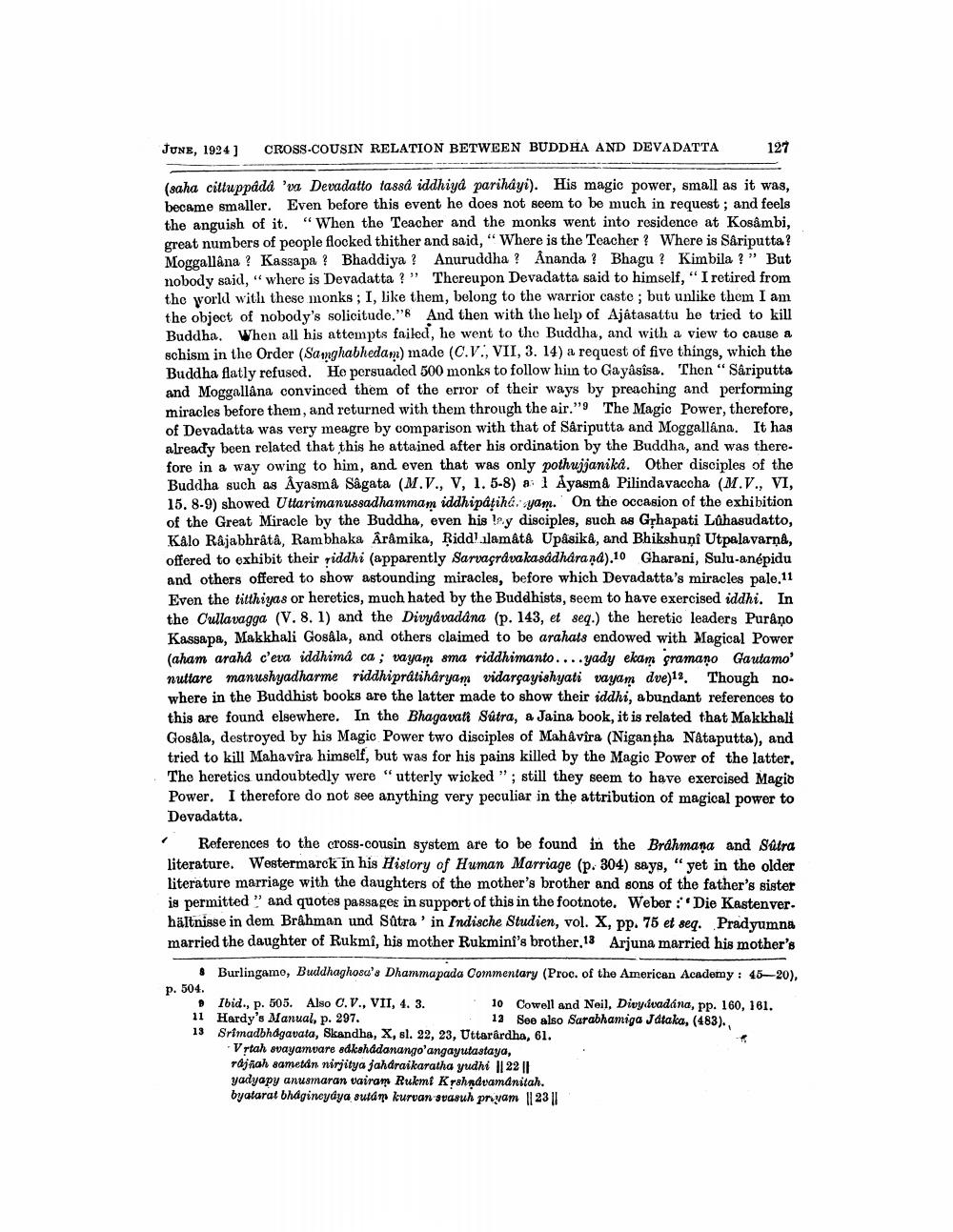________________
JUNE, 1924)
CROSS-COUSIN RELATION BETWEEN BUDDHA AND DEVADATTA
127
(saha cittuppada 'va Devadatto tassd iddhiya parihayi). His magic power, small as it was, became smaller. Even before this event he does not seem to be much in request ; and feels the anguish of it. "When the Teacher and the monks went into residence at Kosâmbi, great numbers of people flocked thither and said, "Where is the Teacher ? Where is Sariputta? Moggallana ? Kassapa ? Bhaddiya? Anuruddha ? Ananda ? Bhagu? Kim bila?" But nobody said, where is Devadatta ?" Thereupon Devadatta said to himself, "I retired from the world with these monks; I like them, belong to the warrior caste; but unlike them I am the object of nobody's solicitude." And then with the help of Ajátasattu he tried to kill Buddha. When all his attempts failed, he went to the Buddha, and with a view to cause a schism in the Order (Sanghabhedam) made (C.V., VII, 3. 14) a request of five things, which the Buddha flatly refused. He persuaded 500 monks to follow hiin to Gayasisa. Then “Sariputta and Moggallana convinced them of the error of their ways by preaching and performing miracles before them, and returned with them through the air."9 The Magic Power, therefore, of Devadatta was very meagre by comparison with that of Sariputta and Moggallána. It has already been related that this he attained after his ordination by the Buddha, and was there. fore in a way owing to him, and even that was only pothujjanika. Other disciples of the Buddha such as Ayasma Sâgata (M.V., V, 1.5-8) a 1 Ayasma Pilindavaccha (M.V., VI, 15. 8-9) showed Uttarimanussadhammam iddhipațihá. cyam. On the occasion of the exhibition of the Great Miracle by the Buddha, even his lay disciples, such as Grhapati Lahasudatto, Kalo Rajabhrâta, Ram bhaka Aramika, Ridd! lamât& Upåsika, and Bhikshuņi Utpalavarni, offered to exhibit their riddhi (apparently Sarvaçrdvakasádharand).10 Gharani, Sulu-anepidu and others offered to show astounding miracles, before which Devadatta's miracles pale.11 Even the titthiyas or heretics, much hated by the Buddhists, seem to have exercised iddhi. In the Cullavagga (V. 8. 1) and the Divyavadana (p. 143, et seq.) the heretic leaders Purano Kassada. Makkhali Gosala, and others claimed to be arahats endowed with Magical Power (aham araha c'eva iddhima ca; vayam sma riddhimanto....yady ekam gramaño Gautamo' nuttare manushyadharme riddhiprátiharyam vidarçayishyati vayam dve)12. Though no. where in the Buddhist books are the latter made to show their iddhi, abundant references to this are found elsewhere. In the Bhagavati Sútra, a Jaina book, it is related that Makkhali Gosala, destroyed by his Magic Power two disciples of Mahavira (Nigantha Nataputta), and tried to kill Mahavîra himself, but was for his pains killed by the Magic Power of the latter, The heretics undoubtedly were "utterly wicked "; still they seem to have exercised Magid Power. I therefore do not see anything very peculiar in the attribution of magical power to Devadatta.
References to the cross-cousin system are to be found in the Brahmana and Sutra literature. Westermarck in his History of Human Marriage (p. 304) says, " yet in the older literature marriage with the daughters of the mother's brother and sons of the father's sister ig permitted” and quotes passages in support of this in the footnote. Weber: Die Kastenver. hältnisse in dem Brahman und Sätra' in Indische Studien, vol. X, pp. 75 et seq. Pradyumna married the daughter of Rukmi, his mother Rukmini's brother,18 Arjuna married his mother's
8 Burlingamo, Buddhaghosu's Dhammapada Commentary (Proc. of the American Academy : 45—20),
p. 504.
Ibid., p. 505. Also C.V., VII, 4. 3.
10 Cowell and Neil, Divydvadána, pp. 160, 161. 11 Hardy's Manual, p. 297.
13 See also Sarabhamiga Jataka, (483). 13 Srimadbhagavata, Skandha, X, sl. 22, 23, Uttarardha, 61.
Vytah svayamvare adkahddanango'angayutastaya, rajnah sametan nirjitya jahdraikaratha yudhi || 22 | yadyapy anusmaran vairam Rukmi Kyahnduamdnitah. byatarat bhágineyaya sután kurvan-suasuh priyam || 23 ||




